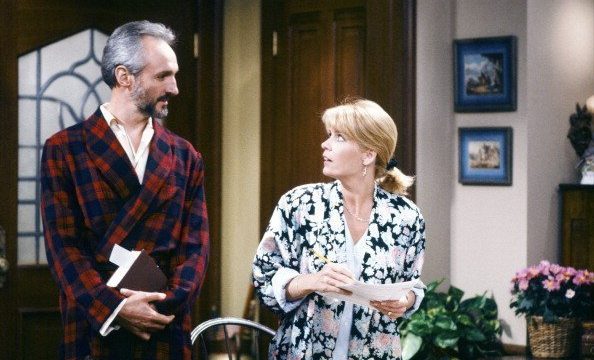Last week, I debated with myself for a while before going for the sitcom. This week, there was no doubt. You can’t talk about Meredith Baxter without talking about Elyse Keaton, at least not if you’re my age. Yes, the Lifetime movies became a running joke after that, but Family Ties lasted from the time I was six to the time I was twelve, and while I may not have watched it a lot in its initial airing—after my bedtime and all—it still left its mark on my memories, and I’ve seen a fair amount in rerun.
I’m not sure I actually wanted Elyse as my mom, though I certainly did more than I wanted Alex as a brother. But she does rather remind me of a woman who lived down the street from me when I was a kid, for whom I used to babysit, who felt like a friend. Elyse was a hippie who lived in suburbia in the ’80s. (Actually, the math of the show doesn’t work, given the kids’ ages and the parents’ ages, but it’s TV.) She was an intelligent, gifted woman—an architect. She shared parenting with her husband, and if she probably did more of the work, well, of course she did. Regardless of the reality for the characters, you know, TV was not going to show a dad doing housework as anything but a joke.
Meanwhile, she was being abused by her husband, which she hid from everyone. In reality, not on the show. In fact, costar Michael Gross has been very honest that he didn’t know. She was on her second marriage at the time; she would marry and divorce one more man before coming out as a lesbian. And acknowledging that her relationship problems stemmed in part from being a lesbian who couldn’t admit it even to herself. I mean, not the abusive marriage, obviously, but relationships just in general. She was sabotaging herself without knowing how or why.
Technically, as a middle-aged white woman, I am the demographic for her Lifetime Original Movies, but to be perfectly honest I’m not sure I’ve seen any of them. For a true-crime fix, I’m more likely to watch documentaries; for a movie fix, I’m more likely to watch, um, good movies. Or nostalgic ones, which the Woman In Danger movies Baxter has made do not qualify as for me. But she’s such a staple of the genre that even without having seen a one, I can perfectly picture a scene from them.
I’m genuinely glad she’s come out the other side of her personal issues and found happiness in her own skin, which seems to be the case. In that, she reminds me a bit of another of my mother-figures, albeit one who was only married twice—once to her husband and once to her wife. Someone who went through a long time of not understanding why she didn’t quite feel right in the life she was leading. I hope that women like her, and like Baxter, are leading the way for a generation of kids who won’t have to be middle aged before they realize that they don’t fit a certain mold and are okay with being their real selves instead.
Help me afford my own babysitter when we can go out again; consider supporting my Patreon or Ko-fi!

